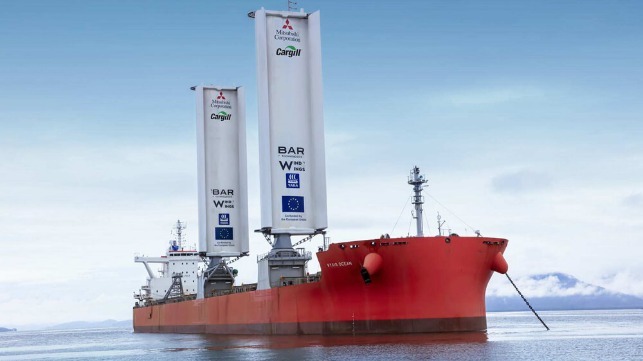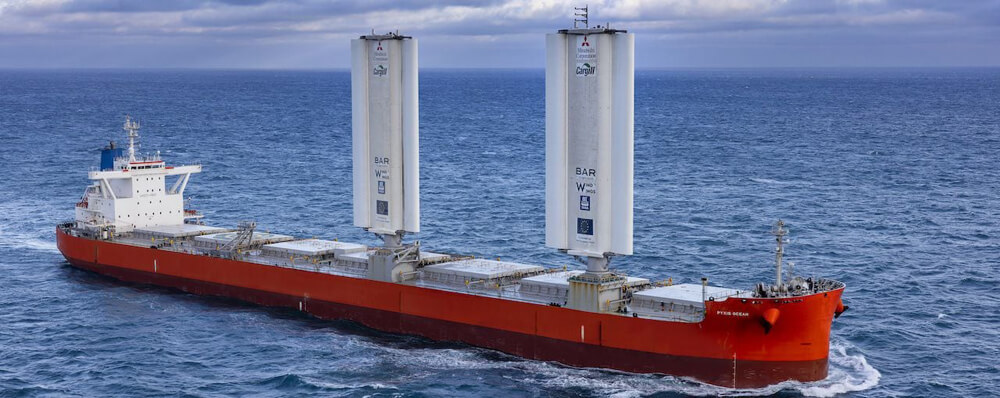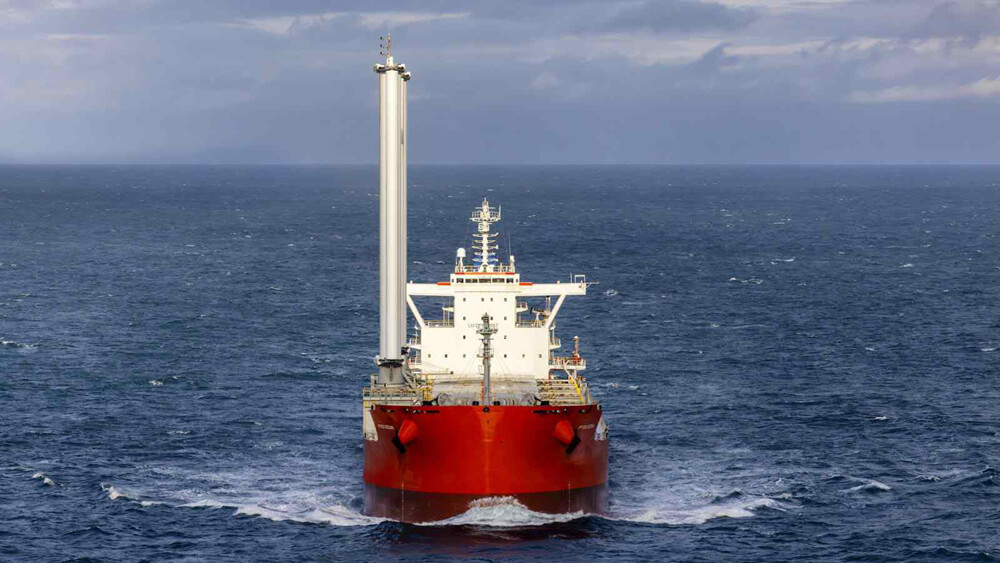Cargill Reports Encouraging Results from 6-Month Sail Test on Bulker

Cargill Ocean Transportation, the ocean shipping arm of the commodities giant, is reporting encouraging results largely in line with projections after the first six months of testing of wind-assisted propulsion aboard a Kamsarmax bulker. Data from the Pyxis Ocean (81,000 dwt) will be used according to Cargill to inform the potential scale-up across the fleet and industry as well as providing learning to further improve the design, operation, and performance of the solid sail technology.
After a partnership that began in 2019 to develop the wind technology, Cargill working with UK-based start-up BAR Technologies moved forward with the first installation of the sails on the 751-foot (229 meter) vessel completing the work in Shanghai in August 2023. The vessel built in 2017 was retrofitted with two 150 feet (37 meter) rigid sails made of a compositive material not unlike the blades for wind turbines.
During the first six months, the vessel which is owned and operated by MC Shipping, a division of Mitsubishi, has completed three voyages. It crossed the Indian, Pacific, and Atlantic oceans, sailed around Cape Horn and the Cape of Good Hope, and encountered all types of weather.

BAR Technologies and Cargill estimated the vessel would achieve an annual average saving of three tonnes of fuel per day, which equates to 11 tonnes per day of CO2 on a well-to-wake basis. This equates to roughly a 14 percent saving for the Pyxis Ocean and they report in the first six months the vessel has been within 10 percent of predictions. During optimal sailing conditions, the Pyxis Ocean achieved a saving of more than 11 tonnes per day in fuel consumption which translates to 41 tonnes per day less CO2 emitted well-to-wake or a 37 percent emissions savings.
“We are encouraged by the results and have learned a great deal about implementation wind-assisted propulsion on dry bulk vessels,” said Jan Dieleman, president of Cargill’s Ocean Transportation business.
The technology is controlled by a touch panel on the bridge and fully automated once the sails are raised. They can be folded down for safety and securing handling as well as during port arrival, departure, and operations. When deployed, sensors constantly measure the wind, and the sails self-adjust to the optimal configuration.
Captain Suraj Vaidya of the Pyxis Ocean highlights that the concept is to lower the engine power using wind energy to maintain speed at lower power and fuel consumption levels. He also recounted a unique use of the sails when they were monitoring a North Atlantic storm.
“We deployed our sails and were able to capitalize on that strong wind coming from Canada,” Captain Vaidya recalls. “We outsailed the storm. On a different ship, the voyage to the English Channel would have taken an extra day or more. With the sails, the Pyxis Ocean maintained very good speed and safely entered the English Channel just ahead of the storm.”

The early voyages have provided insight into more than just the application of the sails on a vessel, it has also highlighted broader logistical challenges in the global maritime system. Given that every port, terminal, and berth is different, the companies said their involvement is critical towards integrating Wind Assisted Propulsion (WAP) technology into the global maritime system on a wider scale. Cargill says it has worked with more than 250 ports worldwide calling the response encouraging.

that matters most
Get the latest maritime news delivered to your inbox daily.
“The results of the Pyxis Ocean’s first voyage with WindWings installed clearly demonstrate that wind-assisted propulsion can secure significant fuel savings and emissions reduction,” said John Cooper, BAR Technologies CEO. He explains that while the Pyxis Ocean has two WindWings, they anticipate the majority of Kamsarmax vessels will carry three wings, further increasing the fuel savings and emissions reductions by a factor of 1.5.
Cargill says it will continue the testing and experimenting of operational, technical, and commercial aspects of the Pyxis Ocean to incorporate the maximum amount of learning into the potential design of future installations before scaling up. Wind-assisted propulsion and the wing sails are just one of several steps Cargill is exploring in its effort to decarbonize operations. The group in partnership is also moving forward with the construction of some of the first methanol-fueled dry bulk carriers and inland in Europe deployed an electric pusher tug and barge.
